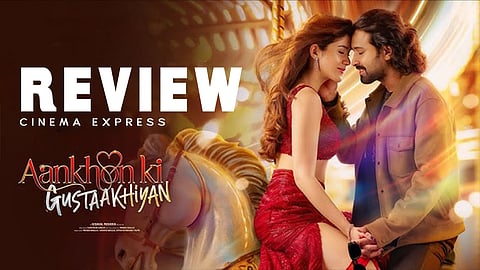Aankhon Ki Gustaakhiyan Movie Review: Vikrant Massey, Shanaya Kapoor seep through a shaky romance
Aankhon Ki Gustaakhiyan(2.5 / 5)
Aankhon Ki Gustaakhiyan Movie Review:
Two strangers meet on a train and thus begins what feels like a lifetime of closeness, intimacy and warmth. They were after all meant to meet each other. So, glances are shared, smiles exchanged—all along as the train passes through some picturesque landscapes. Yes, I am talking about Richard Linklater’s seminal, Before Sunrise (1995) with a charming Ethan Hawke and an ethereal Julie Delpy. But add in a cheeky Shah Rukh Khan and a reserved, bespectacled Kajol and I could very well be talking about a sequence from Dilwale Dulhaniya Le Jayenge (1995). It is interesting how the two films came out just months apart from each other in different continents and languages and told varying stories about the common experience of love. The setting has still not changed thirty years later, as Vikrant Massey and Shanaya Kapoor meet in the same old train in Aankhon ki Gustaakhiyan.
There is a touch of Ruskin Bond’s allure to the tale. Inspired by his short story, ‘The Eyes Have It’, Vikrant plays a visually-impaired musician cum poet, Jahaan. He shares his compartment with Saba (Shanaya), an actor who has blindfolded herself in order to prepare for a film audition. Jahaan plays along as if he isn’t blind, describing the scenery visible from the train window to her. A long take places them in the coziness of the compartment as the two get to know each other with a lively set of exchanges. Both of them are headed to Mussoorie; he to cure his artistic dry spell and she to perfect the mannerisms of her blind character before her look test. There is a stillness in the scene, a certain restraint in the writing which slowly gives way to a Vishal Mishra melody to erupt, extending the magic of Bond’s world with charm.
Directed by: Santosh Singh
Starring: Vikrant Massey and Shanaya Kapoor
Being a Bollywood romance, however, the film cannot afford to stay much longer in the train. So, it moves on to reach bigger destinations, make larger connections. The two are forced to live together in an apartment due to unavailability of extra rooms in the hotel and slowly a growing likeability blossoms into love. Writers Mansi Bagla, Santosh Singh (also director) and Niranjan Iyenger craft scenes that are quietly reflective in the first half. Like the one where Jahaan narrates how he witnessed his parents’ death as a child and damaged his eyes. There is always a poetic touch to the dialogues, which does tend to sound a tad too much at times. But it’s the spark in their conversations that holds it together.
Yet, all of it comes to an end at the interval. It’s only when the film vaguely resembles the romantic spirit of Before Sunrise, with two people discovering each other through dialogue, that it seems to make any sense. As after mid-point, it compulsively turns into just another loud Bollywood romance, where little is at stake. All the warmth of the first half dries up; the calming resonance of the songs withers away. There is just an urgency to make a point about ‘true love’ by sliding into the tropes of all tropes. The story shifts three years ahead and we go to Europe where Saba has a loving, green-flag of a boyfriend. But the traces of her past love life begin to crawl up. Jahaan comes back into her life. It is just a half-baked, unfulfilling Kuch Kuch Hota Hai (1998) all along.
This is also when the performances of Vikrant and Shanaya stop creating likeability for the characters. Shanaya does well in her debut, having to emote just through her voice for the most part without the trace of emotions in her blindfolded eyes. There is a genuine authenticity with which she plays Sabah, evoking innocence with a layer of vulnerability. Vikrant is enticing to watch too as he slips into the body language of a visually-impaired person seamlessly. Although there are times when pity and sympathy come into his act, especially in the inconsistent second half. But that is also due to the existential crisis faced by the screenplay on what to become in the larger scheme of things.
The film also takes an ambiguous approach in understanding its visually-impaired protagonist. In a scene, Jahaan wants Saba to call blind folks Divyang instead of ‘specially-abled’. Maybe the makers don’t know the demeaning implications of the term and how people with disabilities have called it out for being patronizing and disrespectful. Ultimately, it doesn’t quite lead to a just representation. Maybe the makers also don’t realise the soaring potential in the first half and how it slips away, surrendering beauty for chaos in the second half. Maybe they don’t see that there was an opportunity to build a lovely romance at a time when Bollywood is obsessed with guns, ghosts and propaganda. There is no need to shift locations, timelines and countries to make a point about the inevitability of love. A simple train ride with a shared cup of garam chai and a walk through the wintery mountains would have been enough.

